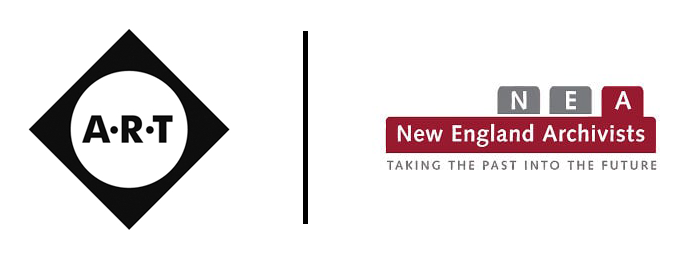◆ NEA/A.R.T. Spring 2018 Meeting: Call for Proposals
New England Archivists (NEA) and the Archivists Round Table of Metropolitan New York (A.R.T.) invite submissions of session proposals for our joint Spring Meeting, to be held March 22 - 24, 2018, in New Haven, Connecticut. The deadline for proposals is September 10, 2017. With the theme “Rise Up,” the Spring 2018 Meeting will focus on concepts of archival advocacy. How can archivists better demonstrate the cultural value and social urgency of their work? What kinds of advocacy can help amplify awareness and bolster support for archival repositories within established institutions? How can best practices evolve to include the stories, traditions, and record-keeping methods of people and communities who are traditionally underrepresented in archival spaces? Sessions, workshops, and plenary speakers will explore the personal, professional, and political implications of archival advocacy, particularly in regard to social justice efforts, economic challenges, activist tactics, and career sustainability for individuals within the archival field. First-time presenters, current graduate students, early-career professionals, and those doing archival work in community-centered contexts are all strongly encouraged to submit proposals. The Spring 2018 Program Committee invites proposals on all topics but is especially interested in sessions that: Share successful tools archivists can use to bolster internal and external advocacy efforts within their institutions, among emerging communities, and to the general public, including strategies for elevating awareness about the value of archival work and special collections Explore how intersectionality, allyship, and radical empathy can impact all aspects of archival work, particularly collection development, arrangement and description, and outreach Discuss methods for personal advocacy that archivists can use to build a stronger sense of professional agency, develop and advance their ideas through clear communication, and foster more equitable, respectful, and supportive relationships with colleagues at every level Incorporate participatory elements that engage attendees and provide actionable knowledge to empower individuals and institutions to adapt their practices to be more inclusive, effective, and transparent Detail collaborative efforts among archivists, institutions, regional organizations, and communities, especially those striving to capture ephemeral forms of documentation Present cross-disciplinary perspectives on archival work, particularly in relation to the development of community archives, political activism, skillshares between archivists and non-archivists, and guerrilla archivist work done in non-institutional contexts Examine how the development, maintenance, and implementation of archival descriptive standards can affect concepts of professional neutrality, historical representation within the archive, and expanded access to materials Facilitate conversations surrounding oppressive power structures and the ethics of authority with regard to the historical functions of archival institutions Highlight work being done to address archival silences, especially regarding materials related to LGBTQIA, indigenous, and carceral communities and in the areas of social justice including racial, labor, disability, economic, reproductive health, and climate issues Focus on the rich histories of people, movements, and organizations in the Connecticut and metropolitan New York City regions Possible Session Types: Standard Presentations Two or three speakers present on a common theme. May include a moderator to steer discussion and/or introduce speakers and theme. Open Forum Topical discussion with moderator leading discussion with everyone present. May include additional moderator(s) to direct breakout conversations. Roundtable Discussion Three or four participants make very brief remarks, then discuss a topic together. Includes a moderator to steer discussion. PechaKucha Each presentation consists of 20 slides or images displayed for 20 seconds each, with comment. Each presentation lasts 6 minutes and 40 seconds. Highest number of presenters possible is 12, fewer if leaving time for questions. Lightning Talks Like PechaKucha, but without a set format. May or may not include slides or images. Presentations may be from 3 to 10 minutes long. Number of presenters depends on time allotted for each. Debate Moderator announces the topic, and two other people debate. Note: standard AV (a projector and screen) will be provided for each session. To facilitate collaboration, the Spring 2018 Program Committee has created a space for NEA and A.R.T members to develop session proposals together: Please use this space to connect with your colleagues about potential session topics and formats. This collaborative space will be accessible until the deadline for proposals, on September 10, 2017. To submit a proposal, please complete this form. Please note that proposed sessions involving fewer than three presenters and/or covering overlapping topics may be grouped together. All submissions will be acknowledged by the Program Committee. If your proposal is selected, your acknowledgment will include instructions about next steps. All presenters are required to register for the conference upon acceptance, at the early-bird rate, and to fund their own travel expenses. NEA and A.R.T. are committed to making the Spring 2018 Meeting welcoming and accessible to all presenters and attendees. Presenters are also required to abide by the NEA Code of Conduct, which can be found here. If you will need specific accommodations, such as interpretive services, to support your participation in this event, please contact the program chairs. Meeting and travel scholarships are available through both NEA and A.R.T. for those in need. Details will be forthcoming on each organization’s website: Questions? Please contact the Program Committee co-chairs: Rachel Chatalbash | rachel.chatalbash@yale.edu |

